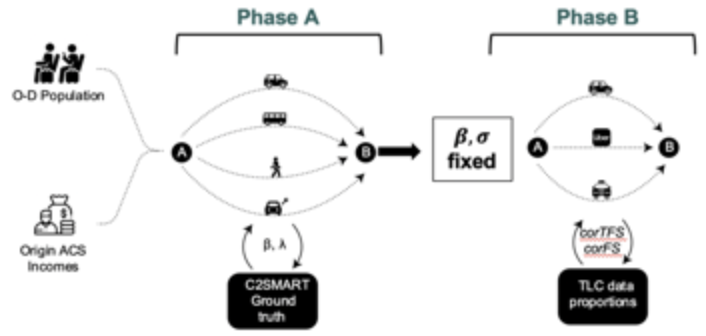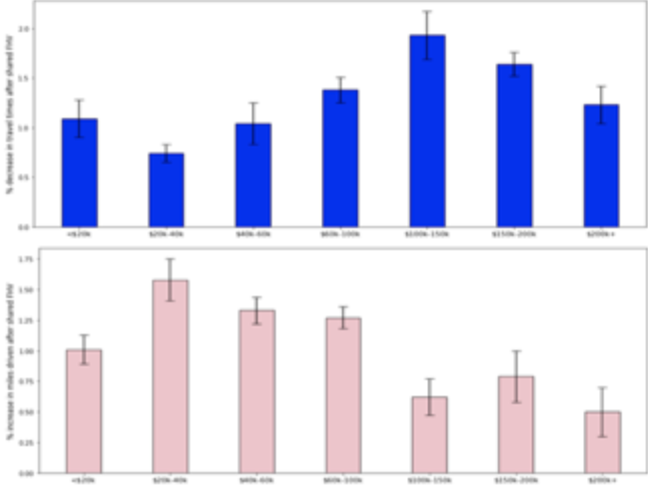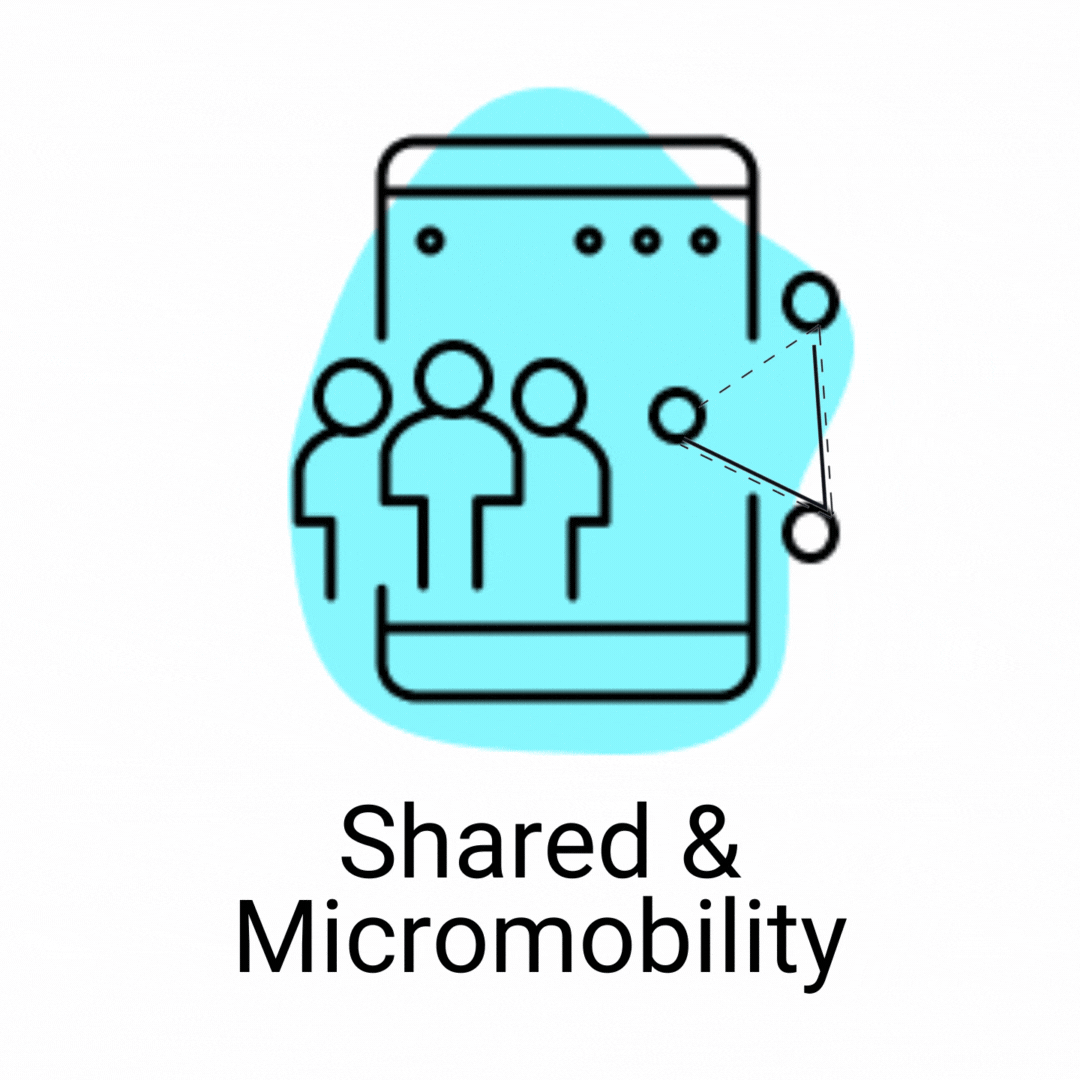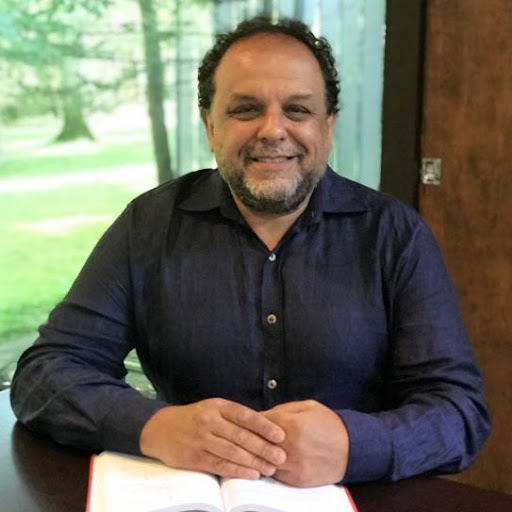Overview
Ride-sharing is now being offered across the globe by UberPOOL, Lyft Shared, and similar solutions, which ultimately change the landscape of urban commutes. However, its holistic impact on the complex urban system, including urban traffic, environment, economy, and urban society with respect to the associated mode shift in multi-modal urban transportation, innovation adoption dynamics, etc., are not fully understood.
Using ridership data from ridesharing providers, mobile phone data, as well as a variety of other publicly available data, this project aims to develop a comprehensive holistic model of urban transportation demand given multiple available modes, including for-hire vehicles and their shared options. The model will enable assessment of the impact of shared mobility on urban transportation mode choice, which can be further translated into economic, social, and environmental impacts.
Research Objectives
Understanding the holistic impact of planned transportation solutions and interventions on urban systems is challenged by their complexity but critical for decision making. The cornerstone for such impact assessments is estimating the transportation mode-shift resulting from the intervention. And while transportation planning has well-established models for the mode-choice assessment such as a nested multinomial logit model, an individual choice simulation could be better suited for addressing the mode-shift allowing to consistently account for individual preferences. In addition, no model perfectly represents reality while the available ground-truth data on the actual transportation choices needed to infer the model is often incomplete or inconsistent.
The project addresses those challenges by offering an individual mode-choice and mode-shift simulation model and the Bayesian inference framework. It accounts for uncertainties in the data as well as the model estimate and translates them into uncertainties of the resulting mode-shift and the impacts. The framework is evaluated on the two intervention cases: introducing ride-sharing for-hire-vehicles in NYC as well as the recent introduction of the Manhattan Congestion Surcharge. Being successfully evaluated on the cases above, the framework can be used for assessing mode-shift and resulting economic, social, and environmental implications for any future urban transportation solutions and policies being considered by decision-makers or transportation companies.
Related Media


Map
Personnel
Deliverables
Details
- Project Title Impact of Ride-Sharing in New York City
- Universities New York University
- Principal Investigator Stanislav Sobolevsky
- PI Contact Information sobolevsky@nyu.edu
- Co-Principal Investigators Kaan Ozbay
- Funding Source(s) and Amounts Provided (by each agency or organization) $90,000 (C2SMART: $60,000; Cost Share from Arcadis: $30,000)
- Total Project Cost $90,000
- USDOT Award # 69A3551747124
- Start and End Date 3/1/2019-8/31/2020
- Brief Description of Research Project The project will develop a citywide data-driven transportation simulation modeling framework for probabilistic assessment of the associated mode-shift and resulting environmental, social and economic impacts of ride-sharing solutions (e.g. UberPOOL, Lyft shared etc) on urban transportation system in New York City efficiently leveraging available partial transportation data. The impacts in question include: travel time cut for passengers, reduction of traffic, gas consumption/ emissions by type (CO, NOx, PM2.5), travel time/cost savings for passengers, increased earnings for Lyft and Uber drivers, jobs for for-hire-vehicle drivers. Once developed, the new framework is readily applicable to the predictive assessment of the impacts of many other transportation pricing and policy decisions, such as Manhattan congestion charge which is scheduled to come into effect by January 2019 – additional use case depicting it will be provided.
- Describe Implementation of Research Outcomes (or why not implemented) The key outcome of the project is a holistic impact assessment of ridesharing and other transportation interventions like a congestion charge, implemented through the multi-layered urban transportation data platform and modeling framework. Recommendations have been given for implementing the framework and specific impact assessment results in urban transportation practice at a broader scale.
- Impacts/Benefits of Implementation (actual, not anticipated) The project will inform transportation planners and other stakeholders of the potential benefits and downsides of implementing digital ridesharing and/or other transportation interventions and policies given the scale of the urban system.









